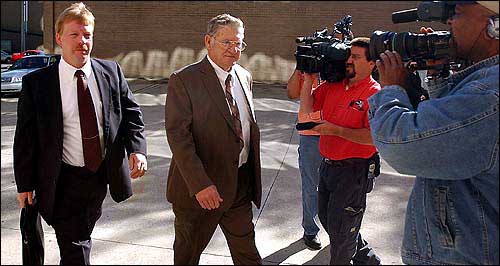Church bombing trial opens
1963 blast that killed four deadliest attack of civil rights era
Birmingham, Ala. ? A former Klansman boasted of bombing the church where four black girls died in 1963, regretting only that he didn’t kill more and wearing the infamous civil rights-era crime “like a Klan medal,” a prosecutor said Tuesday.
But a lawyer for Bobby Frank Cherry said the people who claim to have heard Cherry’s boasts are “inherently unreliable.”

Attorney Rodger Bass, left, and defendant Bobby Frank Cherry arrive at the Jefferson County Criminal Justice Center in Birmingham, Ala., for the first day of oral arguments in Cherry's murder trial. Cherry is accused of participating in a church bombing that killed four black girls in 1963.
Assistant U.S. Atty. Robert Posey opened Cherry’s murder trial with black-and-white photos of the Sixteenth Street Baptist Church and children marching during a period of protests against segregation, taking the jury back nearly four decades when the church was a rallying site for demonstrators.
He said Cherry, 71, told authorities shortly after the bombing that “the only reason he didn’t bomb the church is that someone beat him to it.” Yet at the same time, Posey said, Cherry was boasting to family members that he was responsible.
“He has worn this crime on his chest like a badge of honor … a Klan medal,” Posey said.
Defense attorney Mickey Johnson told jurors they would not be able to trust the witnesses who claim they heard Cherry admit to the bombing. “He did not say this,” Johnson said.
Cherry is accused of helping fellow Klansmen plant a powerful bomb outside the church in the deadliest crime of the civil rights era.
The blast killed Addie Mae Collins, Cynthia Wesley and Carole Robertson, all 14, and Denise McNair, 11, as they got ready for a Sunday morning service on Sept. 15, 1963. Denise’s parents, Chris and Maxine McNair, and Carole’s mother, Alpha Robertson, sat on the front row as the trial opened.
Mrs. Robertson was the first witness. Seated in a wheelchair in front of the jury box, she recalled the morning of the bombing, saying she was still at home getting ready for church when it went off.
“It was just an awful sound, like something shaking the world all over,” she said.
The jury, seated Monday, is made up of nine white women, three white men and four black men. Which four will be alternates rather than members of the 12-person jury will not be disclosed until later.
Johnson said black women were the largest group of potential jurors he removed from the panel. But Johnson said jury selection was based on more than race.
“I don’t think the breakdown on racial lines will be as important as people think it will be,” he said after the judge lifted a gag order imposed during jury selection.
Circuit Judge James Garrett had ruled that Cherry was not mentally competent for trial, but he changed his mind in January after experts concluded Cherry was faking mental illness.
The retired trucker, who lives in Mabank, Tex., was part of a group of Klansmen questioned by the FBI within days of the blast. He had always denied involvement.
However, he was indicted along with another ex-Klansman, Thomas Blanton Jr., on murder charges in May 2000.
Blanton was found guilty last year and is serving a life sentence. Another Klansman, Robert Chambliss, was convicted in the bombing in 1977 and died in prison. A fourth suspect, Herman Cash, died without being charged.
Cherry could get life in prison if convicted.

